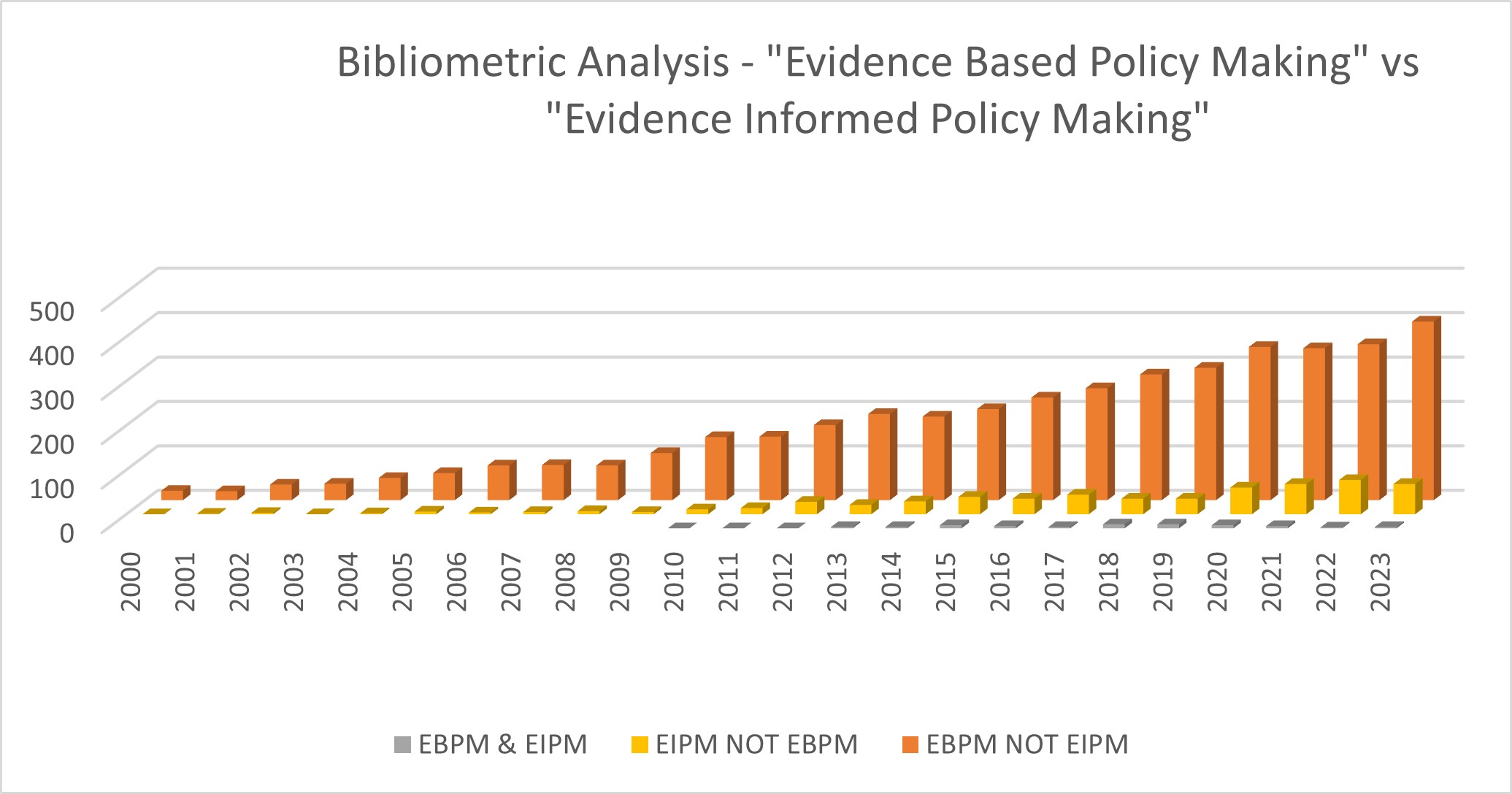“Evidence Based Policy Making” or “Evidence Informed Policy Making”?, by Stephen Gregory
Stephen Gregory is the Library Enquiry Services Manager in Welsh Government Information, Library & Archive Services. Stephen is also the Honorary Secretary to the Government Information Group Committee. He writes in a personal capacity.
This blog post considers how
language surrounding the use of evidence for the creation of governmental
policy may be evolving and specifically looks at the use of the phrases
Evidence Based Policy Making (EBPM), Evidence
Based Policy (EBP), Evidence Informed Policy Making (EIPM) or Evidence Informed
Policy (EIP). The prevalence of these phrases in one bibliographic database is
explored. This leads to the conclusion that it may be time to reappraise our
own use of this terminology in the workplace and professional literature.
The Past
When I joined GKIM as a policy
support librarian in a UK devolved administration in 2006, my librarian
colleagues, as well as government social researchers and policy officials
frequently referred to EBPM. At the time, perhaps naively, to me EBPM offered
an exciting arena for government knowledge and information management (GKIM)
specialists and as well as government analytical professionals (social
researchers, statistician, economists and cartographers) to provide policymakers
with evidence to support effective policy-development. Through the provision of
the best published evidence, I felt that I could really help to make a
difference. At the time we recognised that policy implementation and change
will always have a political dimension. The political colour of the government
of the day naturally determines the palatability or otherwise of certain policy
initiatives. We also recognised that other factors were also in play: financial and
sociological / societal. But somehow these weren’t directly encompassed in the
EBPM terminology. They remained latent factors.
 |
| Nick Youngson / Licensed by R M Media Ltd under a CC BY-SA 3.0 license available from https://www.picpedia.org/post-it-note/e/evidence-based.html. |
Corridor Conversation
Fast-forward to 2023 and a corridor
discussion with a policy official. We were chatting about how evidence is used
in policy making, and out I trip with the phrase “EBPM”. The official very gently
and kindly explained that my terminology was a little dated, and that it may
now be more appropriate to refer to “Evidence Informed Policy Making” (EIPM).
He rehearsed the argument that policy development may be informed by published and
other forms of available evidence. However, additional factors enter the policy
change mix, including a Minister’s political leanings, as well as significant factors
such available funding, competing government priorities, societal issues, and potentially
in the UK devolution context, whether a government has powers to make such
changes.
The change in terminology to
EIPM was a revelation and I am so grateful for that conversation! I have since
shared this with my work colleagues and at a recent Government Information
Group committee meeting. In both cases colleagues were grateful for the
opportunity to explore this potential change in terminology. A great reason for
this blog posting!
Echo Chamber?
I then began to wonder if I
had been stuck in a terminology echo-chamber; a sealed black box? How had I not
picked up on this terminological change sooner?
An analysis using Elsevier’s Scopus database reassuringly suggests
otherwise. It appears that specific reference to EBPM continues to predominate
in the published literature. The phrase “EBPM” first appears in the Scopus
database (in title, abstract or keyword fields) in 1997, with gradually
increasing frequency throughout the early decades of the 21st century.
In 2023 in the Scopus database there are 402 citations quoting the phrases EBP
or EBPM in these fields, and which do not also refer to EIP OR EIPM. The phrase
EIPM does not appear in the Scopus database, in the previously mentioned
database fields, until 2001. EIPM / EIP start from much lower frequencies, in
Scopus at least, and have a slower and more gradual increase in usage. In 2023,
68 Scopus citations included EIPM or EIP, whilst also specifically not
referring to EBPM or EBP. A small number
of citations indexed in Scopus refer to both EBPM / EBP and EIPM / EIP, with
this occurring from 2013 onwards. The bar chart illustrates these trends
(Figure1).
 |
Figure 1. Frequency of EBPM or
Evidence Based Policy, and EIPM or Evidence Informed Policy in the Scopus
database, Title, Abstract or Keyword fields, 2020-2023 (Data at 14 January
2024).
So, the literature indexed in
Scopus demonstrates the continuing predominance of EBPM, and a gradual rise of
EIPM. I have only researched the bibliometrics in Scopus. Grey literature or
monographic sources may tell a different story, but I suspect not.
So what?
My experience indicates that EBPM was always understood as including elements of political, sociological and economic reality, it’s just that these elements remained hidden or blind within the terminology. Recently, the European Parliamentary Research Service recognise the sociological aspects in the application of EBPM whilst retaining the phraseology:
“This paper deals with 'evidence-based policy-making', as it uses the best available scientific evidence to formulate policies. However, 'evidence-based policy-making' does not imply that policy decisions should be taken solely based on scientific evidence. Policy decisions based exclusively on scientific evidence are technocratic, which is not a policy's aim in a parliamentary democracy. Democratic policy-makers usually combine the best available evidence with their understanding of a society's needs, i.e., contextualising the evidence in terms of what they believe is in accord with the citizens' expectations, values and preferences.” Source – EPRS. Evidence for Policy Making. European Parliament, March 2021. PE 690.529. [accessed on 14/01/2024].
The bibliometric analysis from
Scopus demonstrates that we are likely to continue to experience the use of
EBPM or EBP in our professional reading, and no doubt, within discussions. When
we do, we might do well to personally reflect on, and acknowledge, the latent political,
economic, and sociological factors that may also influence, moderate or refute
the application of the evidence in the provision of new or reformed policy, or
indeed in the decision to make no change, to leave things as they stand.
In our own conversations and writings,
it may be more appropriate, transparent, and therefore more accurate to talk in
terms of EIPM or EIP. In doing so we may help others to consider the wider
range of influences involved in governmental policy making, whilst still
valuing the role that GKIM and government analysts can, and do play in
supporting governmental policy design, reform, and evaluation processes.
Get in touch!
Hopefully this blog has helped
you review your terminological use and understanding? We are keen to hear about
your experiences. Does this resonate with you? Are there additional considerations
or perspectives that need to be taken on board?





Comments
Post a Comment